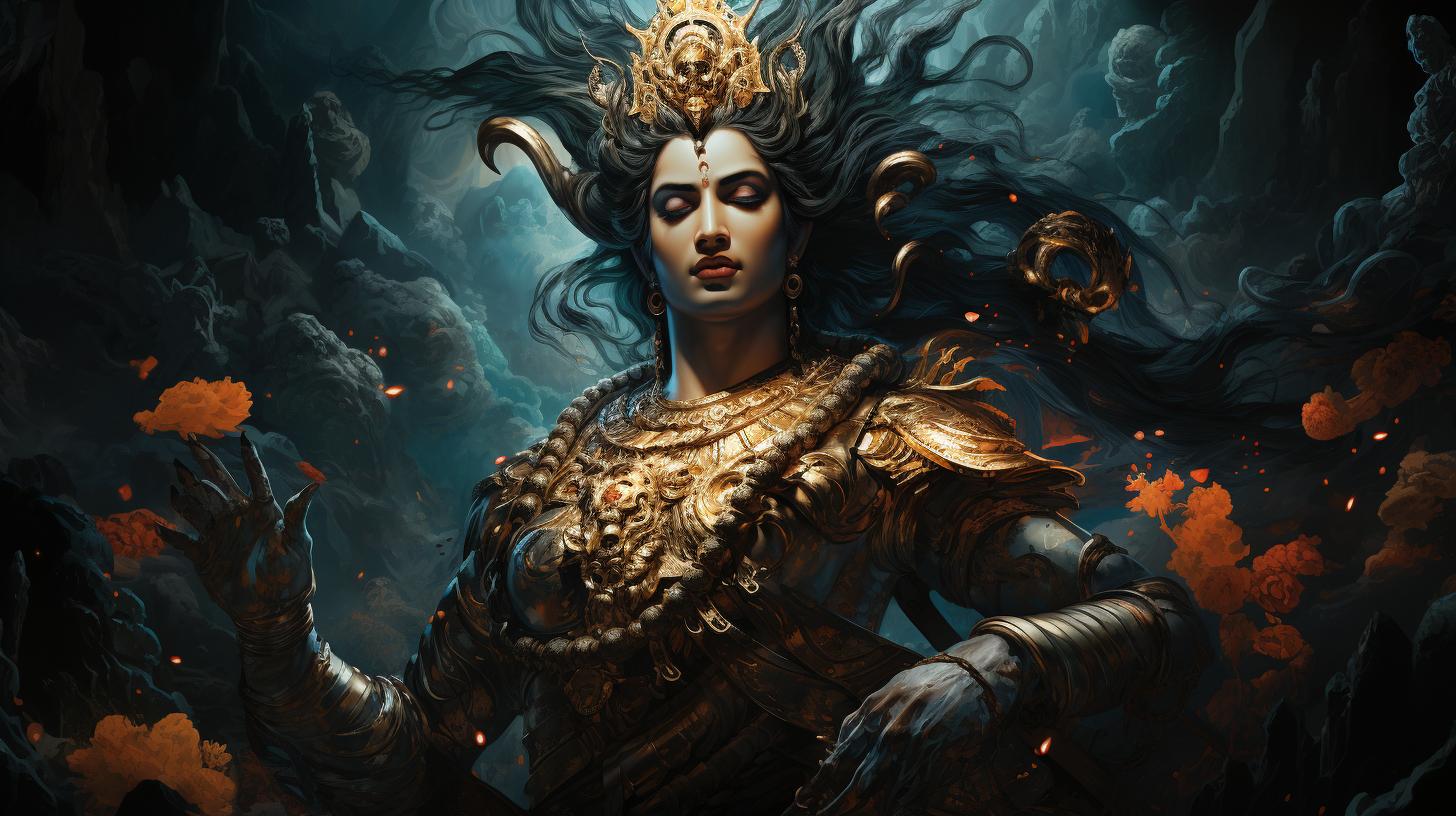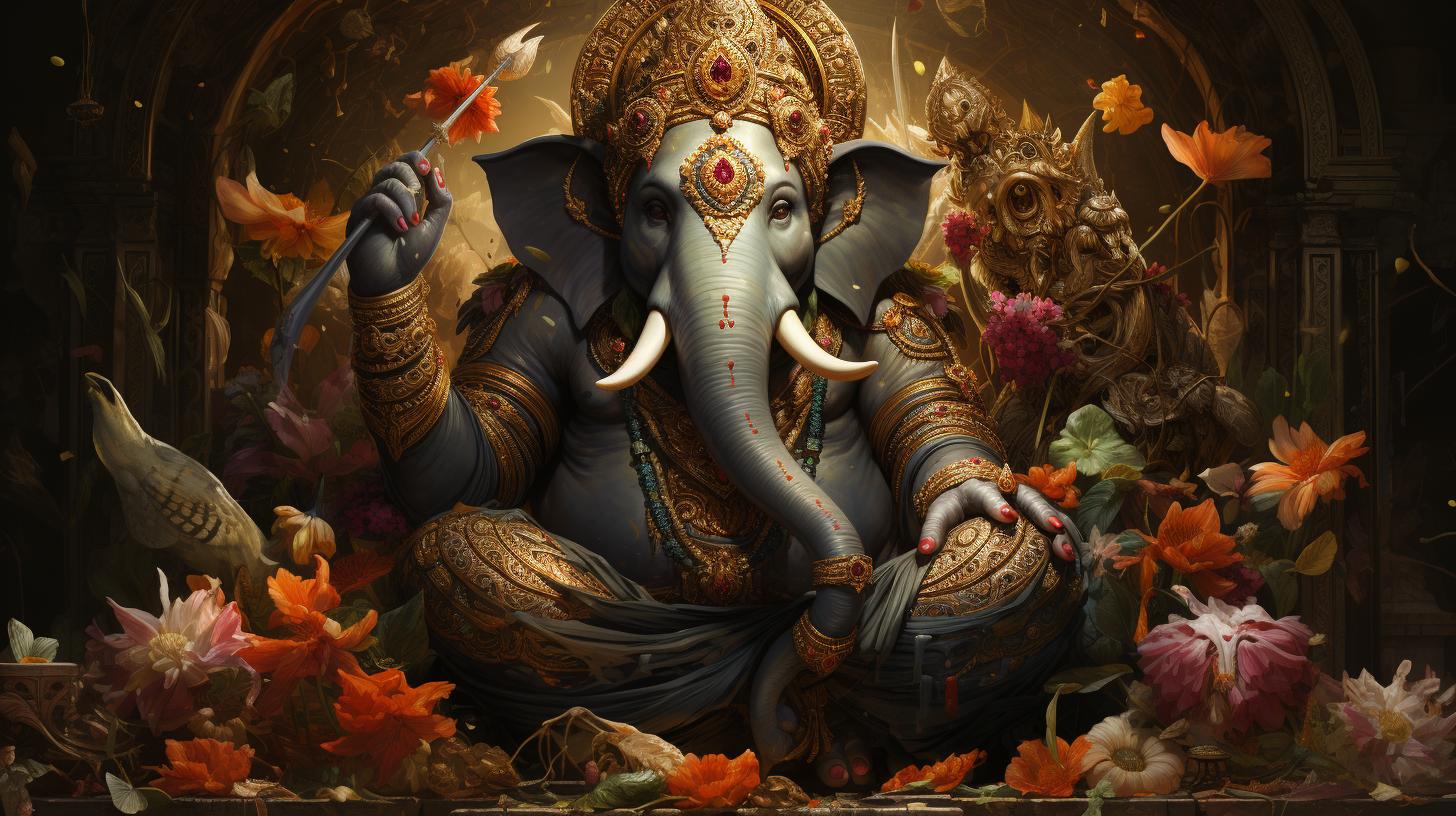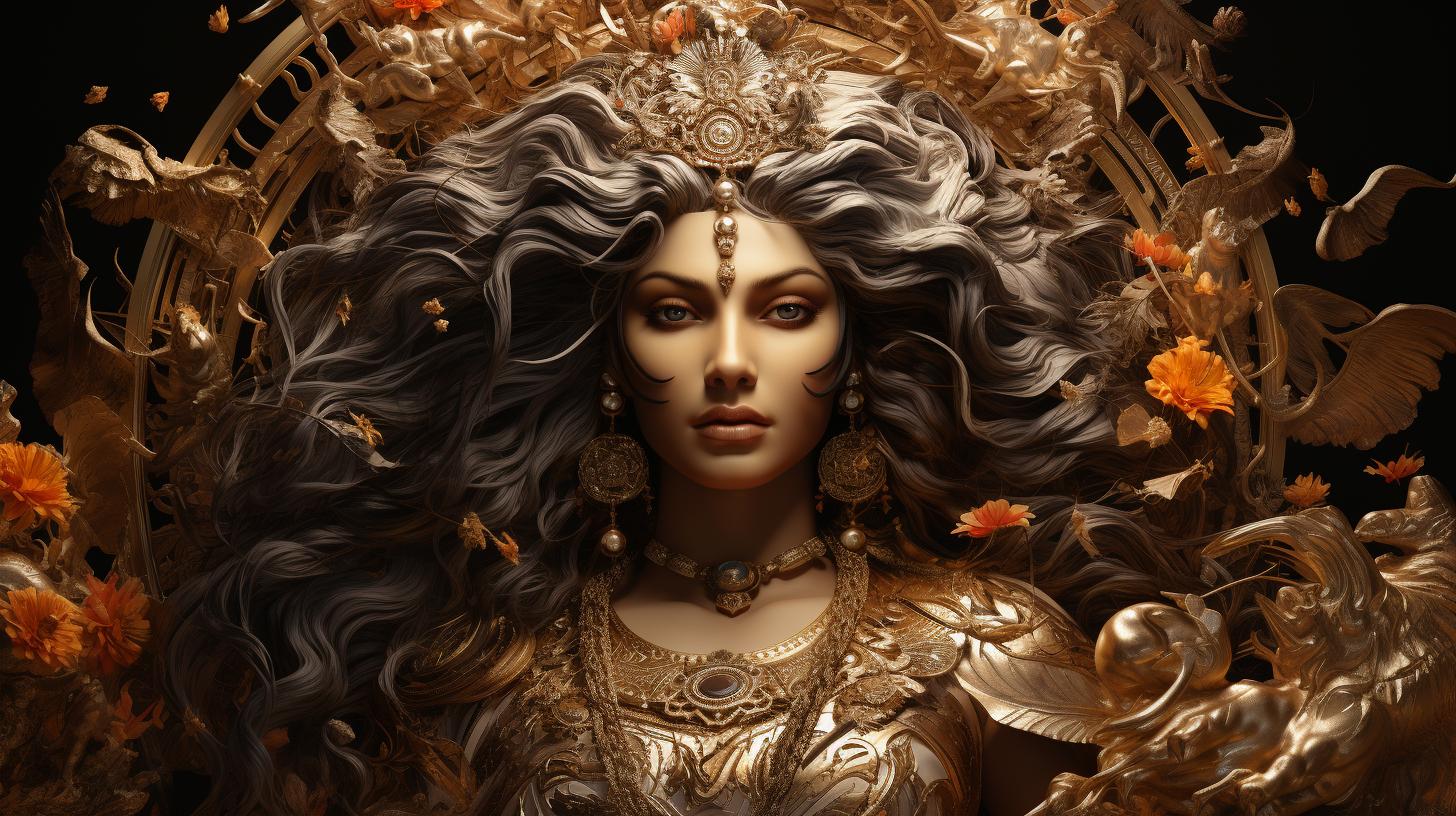Bhumi Earth Goddess: Unveiling the Mysteries of the Hindu Earth Deity

Bhumi Earth Goddess is a revered deity in Hindu mythology, known as the consort of Vishnu’s incarnation, Varaha. Her significance and representations vary across traditions, with Bhumi being considered a manifestation of Lakshmi in Vaishnava beliefs.
This ancient goddess holds an important place in Hindu scriptures, where she is associated with fertility, motherhood, and the environment. Women and girls have a special connection with Bhumi, and her influence on femininity is celebrated.
Bhumi Earth Goddess is also celebrated through various festivals and rituals, such as the Raja Festival. In Odia culture, she holds immense cultural significance. The symbols and iconography associated with Bhumi Earth Goddess reflect her divine presence.
Explore the myths, traditions, and beliefs surrounding this revered deity.
The Origin of Bhumi Earth Goddess
The Bhumi Earth Goddess holds a significant place in Hindu mythology, with a rich background steeped in ancient tales and legends.
Mythological Background
According to Hindu scriptures, Bhumi Earth Goddess is revered as the consort of Varaha, an incarnation of Lord Vishnu. She is believed to have emerged from the waters of the cosmic ocean to bring stability and fertility to the universe.
In the mythological lore, it is said that Bhumi Earth Goddess played a pivotal role in defeating the demon Hiranyaksha, who had submerged the earth in the depths of the primordial waters.
By taking the form of a mighty boar, Varaha, with Bhumi as his consort, rescued the earth and restored balance.
Bhudevi’s Significance and Ancient Representation
Bhudevi, another name for Bhumi Earth Goddess, embodies the sacred nature of the earth and its life-giving properties. She symbolizes fertility, abundance, and sustenance.
Ancient representations of Bhudevi often depict her with motherly attributes, adorned with auspicious ornaments and holding symbols of prosperity.
She is depicted as a gentle and nurturing deity, bestowing her blessings upon all living beings.
Intricately woven into the fabric of Hindu traditions, Bhudevi’s significance extends beyond her role as a consort.
She represents the interconnectedness of all beings with the earth, emphasizing the need for harmony, respect, and care towards the environment.
Explore further to unravel the various roles and names attributed to Bhumi Earth Goddess in different traditions in the subsequent section.
Bhumi Earth Goddess in Hindu Scriptures
The scriptures of Hinduism portray Bhumi Earth Goddess as a significant deity with multifaceted roles and prominent symbolism. Let us delve into two key aspects of her existence: Bhumi as Vishnu’s consort and the diverse roles and names she assumes across different traditions.
Bhumi as Vishnu’s Consort
In Hindu mythology, Bhumi Earth Goddess is revered as the consorted deity to Vishnu’s incarnation, Varaha. Their divine union symbolizes the inseparable connection between the earth and its preservation. Bhumi’s role as Vishnu’s consort highlights her relevance in maintaining cosmic balance and harmony.
Roles and Names of Bhumi in Different Traditions
- Bhudevi: In the Vaishnava tradition, Bhumi Earth Goddess is known by the name Bhudevi, emphasizing her divine status and association with the earth’s elements.
- Bhuvaneshwari: Another name attributed to Bhumi, Bhuvaneshwari signifies her role as the ruler of the universe and guardian of worldly existence.
- Avni: In certain traditions, Bhumi is referred to as Avni, depicting her as the earthly manifestation of fertility, abundance, and nurturing qualities.
- Prithvi Devi: Bhumi Earth Goddess is also recognized as Prithvi Devi, where ‘Prithvi’ signifies the planet Earth itself, highlighting her embodiment of the terrestrial realm.
These various names and roles assigned to Bhumi Earth Goddess across different traditions and texts reflect the diverse aspects of her divine presence and the significance she holds in Hindu mythology.
Bhumi Earth Goddess in Vaishnava Tradition
Bhumi Earth Goddess holds a significant place in Vaishnava tradition, particularly in the worship of Lord Vishnu and his consorts. She is considered a manifestation of Lakshmi, the divine goddess of wealth and prosperity.
As Lakshmi’s incarnation, Bhumi represents the fertile earth, which sustains life and provides abundance to all creatures.
Bhumi as a Manifestation of Lakshmi
In Vaishnava tradition, Bhumi Earth Goddess is revered as one of the manifestations of Lakshmi. Just as Lakshmi is the beloved consort of Lord Vishnu, Bhumi represents the earth, the nurturing force that supports life on this planet.
She embodies the qualities of Goddess Lakshmi, symbolizing fertility, growth, and prosperity.
Devotees believe that by worshiping Bhumi as a manifestation of Lakshmi, they can seek blessings for abundance, prosperity, and overall well-being.
She is regarded as the source of all wealth and resources, highlighting the close relationship between nature and the principles of divine prosperity in Vaishnava belief.
The Divine Family of Bhumi
Bhumi Earth Goddess is an integral part of the divine family in Vaishnava tradition.
As the consort of Varaha, an incarnation of Lord Vishnu, she plays a vital role in the cosmic order. Together, they are the divine parents of various offspring, including Narakasura, Mangala, and Sita.
This divine family represents the harmonious relationship between earth, nature, and the divine realm.
Bhumi’s association with Varaha demonstrates the bond between the earth and the divine power that sustains and protects it. Devotees pay homage to this divine family, seeking their blessings for a balanced and prosperous existence.
- Bhumi Earth Goddess as a manifestation of Lakshmi symbolizes the earth’s fertility and abundance.
- Worshiping Bhumi is believed to bring blessings of prosperity and well-being.
- Bhumi Earth Goddess is an integral part of the divine family in Vaishnava tradition.
- She represents the harmonious relationship between earth and the divine realm.
Explore the deep-rooted traditions and beliefs associated with Bhumi Earth Goddess in Vaishnava tradition.
Discover the profound significance of worshiping her as a manifestation of Lakshmi and the divine family she is a part of.
Bhumi Earth Goddess and Women Empowerment
Women and girls play a crucial role in the worship and reverence of Bhumi Earth Goddess. Their relationship with Bhumi goes beyond mere adoration; it is a deep connection based on empowerment and strength.
Here, we explore the significance of women’s association with Bhumi and how she influences aspects of femininity, fertility, and motherhood.
Women and Girls’ Relationship with Bhumi
Women and girls have long recognized Bhumi Earth Goddess as a symbol of their own power and resilience. Through rituals and prayers, they seek her guidance and blessings in various stages of life.
Bhumi represents the earth’s nurturing qualities, just as women nurture their families and communities. It is through this shared essence that women find inspiration and embrace their inherent strength.
Furthermore, Bhumi offers a sense of belonging and connection to nature.
Women and girls often find solace in her presence, seeking her support during challenging times. They turn to her for guidance in cultivating self-esteem, asserting themselves, and finding their place in society.
Bhumi embodies the embodiment of feminism and serves as a reminder of the inherent power within every woman.
Bhumi’s Influence on Femininity, Fertility, and Motherhood
The influence of Bhumi Earth Goddess extends beyond empowerment and extends to aspects of femininity, fertility, and motherhood. Many women invoke her blessings to enhance their femininity, embracing their unique qualities and embracing their womanhood.
Bhumi inspires women to embrace their feminine essence, encouraging them to celebrate their strength, grace, and sensitivity.
Additionally, Bhumi plays a pivotal role in matters of fertility and motherhood. Women seek her divine intervention when trying to conceive, praying for her blessings to grant them the gift of motherhood.
Through her association with fertility, Bhumi Earth Goddess offers women support and hope, reminding them of the natural cycles of life and their connection to the Earth.
In summary, Bhumi Earth Goddess holds a special place in the hearts of women and girls.
They admire her as a symbol of empowerment, drawing inspiration from her nurturing qualities and seeking her guidance in navigating the different aspects of femininity, fertility, and motherhood. Bhumi’s presence serves as a reminder of women’s inherent strength and their unique connection to nature.
- The relationship between women and Bhumi Earth Goddess is based on empowerment and strength.
- Women seek Bhumi’s guidance and blessings throughout different stages of life.
- Bhumi represents the nurturing qualities of women and the Earth.
- Women find inspiration and embrace their inherent strength through their association with Bhumi.
- Bhumi offers a sense of belonging and connection to nature for women and girls.
- Women invoke Bhumi’s blessings to enhance their femininity.
- Bhumi inspires women to celebrate their strength, grace, and sensitivity.
- Bhumi plays a role in matters of fertility and motherhood.
- Women seek Bhumi’s divine intervention for the gift of motherhood.
- Bhumi Earth Goddess reminds women of their connection to the Earth and the natural cycles of life.
Bhumi Earth Goddess and the Environment
Bhumi Earth Goddess plays a significant role in promoting agriculture and sustainable living.
In Hindu scriptures, she is often portrayed as the nurturer of the earth, responsible for its fertility and abundance. Her presence highlights the importance of maintaining a harmonious relationship with the environment.
Bhumi’s Role in Agriculture and Sustainable Living
Bhumi Earth Goddess is revered as the guardian of agricultural lands. Farmers and agricultural communities seek her blessings for fruitful harvests and protection against natural calamities. She symbolizes the interconnectedness between humans and the earth, emphasizing the need for sustainable farming practices and responsible land management.
Through her association with agriculture, Bhumi Earth Goddess encourages the use of organic farming techniques, minimizing the use of harmful pesticides and promoting biodiversity. Her devotees are inspired to adopt eco-friendly methods that promote soil fertility, conserve water resources, and preserve the overall ecological balance.
Interdependence and Respect for Nature
The worship of Bhumi Earth Goddess reminds us of the interdependence between humans and nature. She teaches us to respect and honor the natural world that sustains us. Devotees learn to coexist with the environment, recognizing the profound impact of their actions on the earth.
By embracing the teachings of Bhumi Earth Goddess, individuals are encouraged to adopt sustainable lifestyles that reduce waste, promote recycling, and minimize pollution. This not only benefits the environment but also creates a healthier and more balanced way of living.
Through the goddess’s influence, a sense of stewardship towards the earth is fostered, instilling a deep appreciation for the gifts of nature.
- Promoting eco-conscious behaviors
- Encouraging waste reduction and recycling
- Minimizing pollution and carbon footprint
- Advocating for conservation and preservation of natural resources
As people reflect on the teachings of Bhumi Earth Goddess, they begin to realize the importance of sustainable practices in creating a better future for generations to come.
By nurturing and protecting the environment, they honor the divine presence of Bhumi Earth Goddess and contribute to the overall well-being of the earth.
Bhumi Earth Goddess Traditions and Festivals
Bhumi Earth Goddess is deeply revered in Hindu culture, and her traditions and festivals hold immense significance. These celebrations provide an opportunity for devotees to honor and connect with Bhudevi, seeking her blessings and guidance.
Let us explore two notable aspects of these traditions: the Raja Festival celebrating Bhudevi and the rituals and customs observed during the monsoon season.
The Raja Festival Celebrating Bhudevi
One of the most vibrant and joyous festivals dedicated to Bhumi Earth Goddess is the Raja Festival. Celebrated predominantly in the eastern Indian state of Odisha, this festival pays homage to Bhudevi’s nurturing presence and celebrates the agricultural prosperity she bestows upon the land.
During the Raja Festival, women and girls dress in traditional attire, adorned with beautiful jewelry, and indulge in various cultural activities.
On the first day, known as “Pahili Raja,” the earth is believed to be in a menstrual cycle, and thus, agricultural activities are temporarily ceased.
Women offer prayers and perform rituals, symbolizing the rejuvenation of the earth during this time. The second day, called “Mithuna Sankranti,” signifies the transition of the solar month and the beginning of the monsoon season.
It is celebrated with traditional games, swinging on decorated swings, savoring sumptuous delicacies, and rejoicing in the blessings of Bhudevi’s fertility and abundance.
As the Raja Festival unfolds, devotion, vibrant colors, delectable cuisine, and cultural performances fill the air, creating an atmosphere of joy and reverence for Bhumi Earth Goddess.
Rituals and Customs During the Monsoon Season
The monsoon season holds a special place in the Bhumi Earth Goddess traditions. It is believed that Bhudevi blesses the earth with rainfall, symbolizing the fertility and growth of crops. During this season, several rituals and customs are observed to pay homage to Bhumi’s role in sustaining life and nourishing the planet.
Communities come together to perform rituals like “Bhumi Puja,” where prayers and offerings are made to Bhudevi, expressing gratitude for her bountiful blessings. These rituals are performed in fields, gardens, and temples, symbolizing the interconnectedness between nature and spirituality.
Additionally, various agricultural practices, such as sowing seeds, are initiated during this time. Farmers seek the divine blessings of Bhumi Earth Goddess for a fruitful and prosperous harvest. As the monsoon showers nurture the land, devotees embrace the notion of coexistence with nature and the importance of sustainable living.
Through the Raja Festival and the observance of rituals during the monsoon season, devotees express their reverence for Bhumi Earth Goddess, recognizing her integral role in fertility, abundance, and sustainable living.
Bhumi Earth Goddess in Odia Culture
Bhumi’s Cultural Significance in Odisha
In the vibrant state of Odisha, Bhumi Earth Goddess holds immense cultural significance. She is deeply revered and celebrated as a symbol of fertility, abundance, and prosperity. The people of Odisha have a close connection with the land and agriculture, and Bhumi is considered as the divine guardian of the region’s fertile soil.
Her presence is particularly evident during the Raja festival, where she is worshiped with great devotion and enthusiasm. This festival showcases the deep-rooted cultural traditions and the inseparable bond between the people of Odisha and their beloved Bhumi Earth Goddess.
Special Odia Delicacy: Poda Pitha Preparation
A unique and cherished aspect of Odia culture is the preparation of a special delicacy called Poda Pitha. Poda Pitha is a traditional cake made with rice flour, jaggery, grated coconut, and various aromatic spices.
It holds a special place in Odia households, especially during festivals and auspicious occasions dedicated to Bhumi Earth Goddess. The preparation of Poda Pitha is a time-honored tradition passed down through generations, symbolizing the offering of gratitude to the goddess for the bountiful harvests and blessings.
The aroma and taste of Poda Pitha evoke a sense of nostalgia and joy, further reinforcing the cultural significance and culinary heritage of Odisha.
- Prepared using rice flour, jaggery, grated coconut, and aromatic spices
- A symbol of gratitude for bountiful harvests and blessings
- Traditionally prepared during festivals and auspicious occasions
- Symbolizes the cultural heritage and culinary traditions of Odisha
With its rich cultural traditions, festivals dedicated to Bhumi Earth Goddess, and the preparation of delightful delicacies like Poda Pitha, Odisha’s culture thrives and reflects the deep reverence and devotion for this divine deity.
The people of Odisha continue to uphold these customs, passing them on to future generations, thus ensuring the everlasting presence of Bhumi Earth Goddess in their lives.
Note: The information provided in this section is based on the cultural practices and traditions associated with Bhumi Earth Goddess in Odisha, and may vary in different regions and communities.
Bhumi Earth Goddess: Symbols and Iconography
Symbolism plays a crucial role in the worship and representation of Bhumi Earth Goddess. Her sacred symbols and iconography evoke deep spiritual meanings and reinforce the devotees’ connection with her divine energy.
Let’s explore two important aspects of Bhumi Earth Goddess’ symbolism:
Clothing and Beautiful Ornaments
Bhumi Earth Goddess is often depicted wearing exquisite clothing and adorned with beautiful ornaments. Her attire symbolizes fertility, abundance, and prosperity. She is usually dressed in vibrant colors, representing the vibrant nature of the earth itself.
The ornate jewelry she wears signifies her divine status, be it intricate necklaces, bracelets, earrings, or anklets. These embellishments highlight her grace and magnificence as the earth’s guardian.
Hands and Feet Representations
- Abhaya Mudra: Bhumi Earth Goddess is depicted with her right hand raised in the Abhaya Mudra, the gesture of fearlessness and protection.
It signifies her benevolence and assurance of safety to all who seek her guidance and shelter.
- Varada Mudra: In some representations, Bhumi Earth Goddess also showcases the Varada Mudra with her left hand, symbolizing her ability to grant boons, blessings, and fulfill the desires of her devotees.
- Lotus Feet: Another iconic aspect is the portrayal of Bhumi Earth Goddess with lotus feet.
The lotus is a sacred symbol in Hinduism, representing purity, enlightenment, and spiritual growth. Her lotus feet embody her connection with the divine and serve as a sacred pilgrimage site for devotees to seek blessings.
These symbols and iconography associated with Bhumi Earth Goddess showcase her divine power, grace, and her role as the nurturing, protective deity of the earth.
Understanding and embracing these symbols deepen our spiritual connection with her and reinforce our commitment to the preservation and respect for the environment.
Bhumi Earth Goddess: FAQs and Common Queries
Beliefs and Myths Surrounding Bhumi
Curious about the fascinating beliefs and myths surrounding Bhumi Earth Goddess? Here we address some of the commonly asked questions:
What is the significance of Bhumi Earth Goddess in Hindu mythology?
Bhumi, also known as Bhudevi, holds immense significance as the goddess of the earth in Hindu mythology.
She is considered the consort of Varaha, an incarnation of Vishnu, and is revered for her role in fertility and sustenance.
Are there any particular stories or myths associated with Bhumi Earth Goddess?
A popular mythological tale surrounding Bhumi Earth Goddess is her connection with the Matsya avatar of Vishnu. It is believed that when the world was submerged in water during the great flood, Bhumi emerged as a tiny seed and grew into a vast landmass, providing a safe haven for life to flourish.
How is Bhumi Earth Goddess depicted in art and iconography?
Bhumi Earth Goddess is often depicted with a serene demeanor, seated gracefully on a lotus or surrounded by bountiful vegetation. She is adorned with beautiful garments and accessories, symbolizing her role as the divine nurturer of the earth.
Practices and Traditions Associated with Bhudevi
Discover the practices and traditions associated with Bhudevi, the divine earth goddess:
What are some common rituals performed to worship Bhudevi?
- Laying offerings of fruits, grains, and flowers to honor Bhudevi’s nurturing qualities.
- Performing sacred ceremonies during agricultural harvests to seek her blessings for abundant crops.
- Observing fasting and prayers dedicated to Bhudevi on specific auspicious occasions.
Are there any festivals celebrated in honor of Bhudevi?
- The Raja Festival, celebrated primarily in Odisha, is a vibrant celebration dedicated to Bhudevi.
It marks the onset of monsoon and showcases the deep bond between the earth goddess and the agricultural heritage of the region.
- During the festival, various traditional games, cultural performances, and rituals are organized to express gratitude to Bhudevi for her blessings on the land.
Explore the rich customs and traditions associated with Bhudevi and honor the divine earth goddess, embodying the essence of fertility and sustenance.
.




















